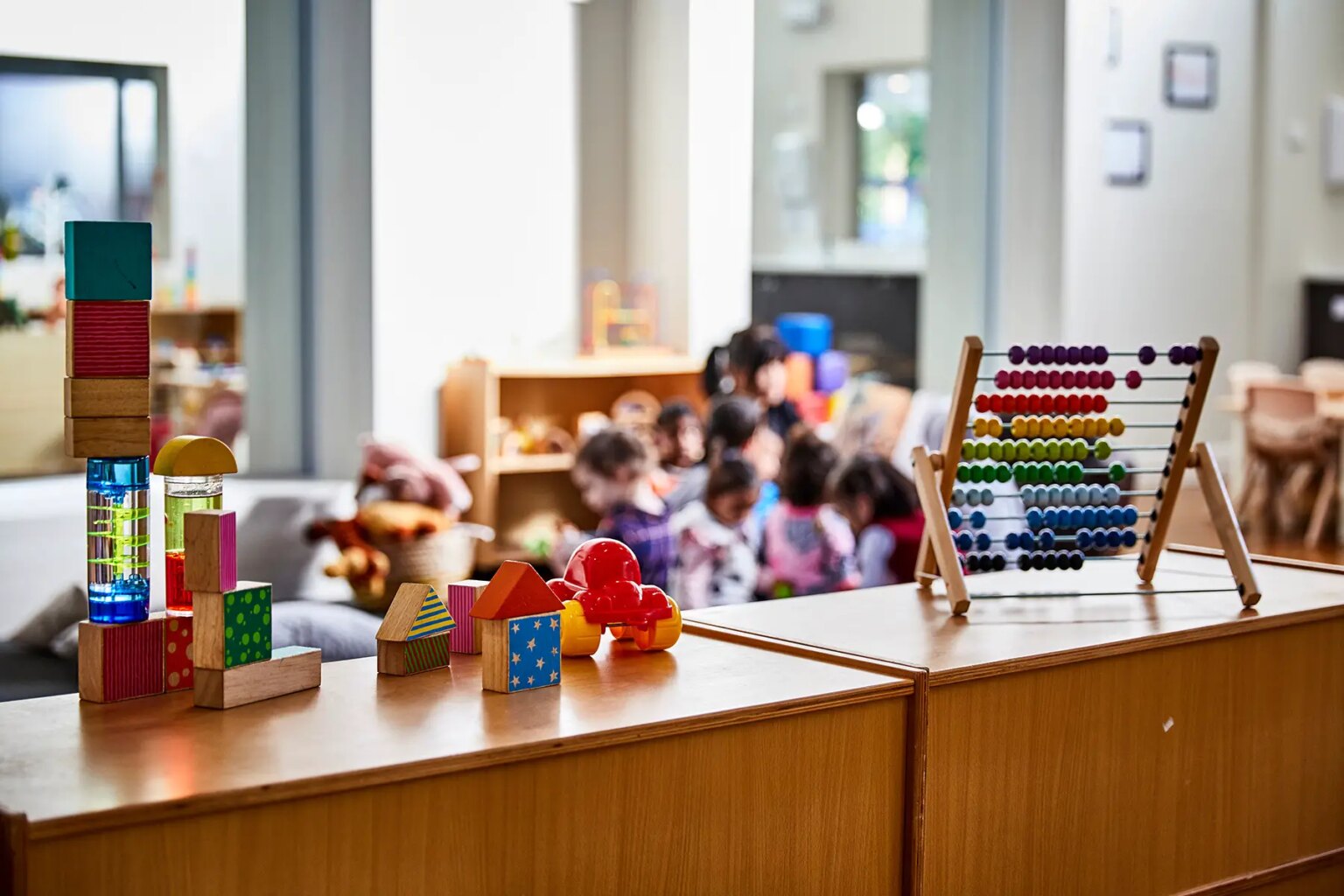Over half of the families living in the Grand Duchy use some type of childcare after having a baby in Luxembourg. More than a third use a daycare crèche for kids four years old or younger. Children here spend nearly 30 hours a week at some form of daycare. A smaller portion use the services of a nanny, au pair, or paid parental assistant. Learn more about the different options of daycare and childcare in Luxembourg, government benefits, and how to enroll your child. Here are the many options families living in Luxembourg have for providing the best child care.
Crèches in Luxembourg: public and private
Children ages four and under in Luxembourg can take part at a crèche, similar to a nursery school. Crèches are available to all Luxembourg residents and highly recommended by the Luxembourg Ministry of Education. Many parents see crèches as a prep course for pre- and primary school (whether local or international), teaching independence and self-confidence in games, social exercises, and activities. Vaccinations are not a requirement but are strongly recommended.
Luxembourgish is the language of public crèches. Crèches can be public with state-subsidies, or privately owned. Either way, they are equally regulated by the government via eligibility rules, education standards, and requirements. Before enrolling your child into a crèche, parents must live in Luxembourg; at least one parent needs to be employed or seeking employment. To enroll your child, consider applying as soon as you move to Luxembourg and claim residence. Once your child is in one, there is often a requirement to be present three or four days per week.
Multilingual private crèches
Many international families looking for a French-, German-, Spanish-, or English-speaking crèche program choose a private crèche. Privately-owned crèches are just as legitimate as public crèches; they must register with the state and follow the same rules as the rest. Another plus for private crèches is the flexible hour requirements for a child’s attendance. There are also lenient requirements to enroll in a private crèche, like accepting a child regardless of the parent’s residence status or place of employment. The drawbacks are higher fees.
Find a crèche
Waiting lists can be several months long, and single parents take priority over others. Like many surrounding countries, there are waitlists to enrol children in crèches due to high demand and low supply. Guichet.lu is where the Ministry of Family and Integration provide a list, sorted by district, of all registered childcare centers in the Grand Duchy. Ville de Luxembourg has a list of registered crèches within the City of Luxembourg specifically.
Childcare benefits in Luxembourg, fees, and the Cheque-Service Accueil
Cheque-Service Accueil
In general, the amount due from parents depends in any crèche system is based on household income. Fees of private crèches might be higher in comparison to the public crèches. However, parents can apply for financial support through Cheque-Service Accueil. These childcare cards work like vouchers parents can use to help reduced fees for any public or private crèche registered by the state.
It is free to apply for the Cheque-Service at your local administration commune. However, to qualify the child must be a resident of Luxembourg, and 12 years old or younger. Once a parent registers, they receive a card that they present at crèche enrolment to benefit from reduced rates. This Cheque-Service” card is mandatory for enrolment at day nurseries as well, and the card is valid for one year.
Financial aid
As for financial aid, there is a family allowance, covering children up to the age of 18. The allowance pays out at the start of each year. The amount varies according to the number of children living in the household and their age. The allowance continues for students to the age of 27, as long as they are a student living in Luxembourg.
The state also pays a schooling allowance in August each year for all kids above the age of six. To increase support to low-income families, child allowance policies and tax policies are often coordinated.
Day nurseries
When living in Luxembourg you might also consider a day nursery for child care. Nurseries are similar to crèches, and admit children between the ages of two months and eight years. However, unlike crèches, the time limit for children attending day nurseries is a maximum of 16 hours per week. Like crèches, day nurseries may be run by the municipality, public or private, and adhere to rules and regulations made by the state. Overall, nurseries are more as an occasional help for families, and also a tool to help transition children from home life into an environment with other children.
Day centers and maison relais
Day centers take school children between the ages of four until the end of fundamental education (12 years old). The goal of day centers is to be open when school hours are closed, as a place for children to eat lunch together at the cafeteria and do homework together after school. They also tend to be open during school holidays.
Maison relais were introduced in 2005 by the Ministry of Family Affairs and Integration as another option to day center facilities. Maison relais were made to be more flexible with hours and overall conditions, and their head responsibilities are to offer supervision, meals, fun activities, and homework assistance. The enrollment age limit is wider, as maison relais look after children ages three to up to 12-years-old or older depending on the circumstances. For flexible hours, they stay open from 7:00 to 19:00 to make it easier for parents working long hours or with strict work commitments.
For a full list of maison relais in Luxembourg, visit the Yellow Pages listings.
Parental assistants, nannies, and au pairs
Individual care in your own home can help children settle into Luxembourg. It can also be a good way to provide English or other mother-tongue language contact. As a short-term or long-term substitute of day care, parents and families hire nannies, parent assistants or babysitters for full-time (25 or more hours per week) or part-time as a more personal an individual childcare. In each case, a clear agreement (ideally in writing) over what will be covered by both parties provides a solid foundation for employment. As you will be an employer, you may have to deal with employer’s responsibilities such as health insurance, tax and other paperwork.
Parental assistants
A parental assistant cares after children in their own home atmosphere. Each assistant terms can vary, and each one will set their own availability and the ages they are willing to work with. Some will take infants and secondary school children, but most focus on toddler and primary age kids. Hours available are usually more lenient and flexible than the crèche and day nursery alternative, and include light nursing like caretaking when a child is unwell.
Nannies
A professional nanny may have childcare qualifications from their country of origin or German ones – these vary from state to state. The nanny should also have experience and be able to deal with very small children and babies. They can live in or not, and should be treated as employed professionals with a pre-agreed upon hourly work week.
Au pairs
An au pair will typically be much more affordable than a nanny, but usually not as experienced. They are usually teenagers or young adults far from home, and they will usually live with the family who hires them (which can be a good thing). Expect to provide room and board, health insurance and if necessary language classes in exchange for personal, fulltime childcare. Babysitters typically have no qualifications and ages and experience may fall anywhere on the spectrum, from a teenager to a retired nurse. They usually have a CV on hand when applying.
Early education
Early learning is available from the age of three. This is especially valuable for a foreigner, as it aids familiarisation with the language and culture. The Luxembourg government has focused on childcare and early learning in reaction to a shortage of facilities and the increase in working mothers and expat families. The early teaching option does not replace child care, and if child care is necessary, the parents must organise this outside teaching hours like maison relais that looks after children. Prices are reasonable compared to crèches.
Preschool
When your child turns four years old and is a resident living in Luxembourg, he or she will transfer into preschool. The cut-off is four years old by 1 September that year. Pre-school is an early childhood education that consists mostly of working on a child’s social skills, and learning Luxembourgish as a way to communicate is a focus. Classes are usually Mondays, Wednesdays, and Fridays from 8am to 4pm, and Tuesdays and Thursdays from 8am to 11:45am. Children come home for lunch, but if both parents work then lunch is provided at the maison relais daycare nearby.
Terms (French – German)
- Childcare: garde d’enfants – kinderbetreuung
- Maternity: maternité – mutterschaft
- Birth: naissance – geboren
Useful resources
- Service Info-Crèches: provides comprehensive information related to childcare in the City of Luxembourg. Call 46 08 08 330 to book a meeting.
- The Ministry of National Education (MEN) can provide detailed information on the educational system in Luxembourg and runs a special, multilingual service to foreign families. Call 24 78 52 07.
- The American Woman’s Club of Luxembourg has contacts of English-speaking babysitters.
- The MEN’s department of differentiated education (Service de l’education différenciée) has information on education for children with a handicap.
- EU information page for parenting in Luxembourg
- Child policy in Luxembourg, Columbia University pages




